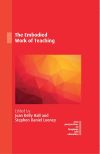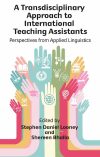Stephen D. Looney

Education
Professional Bio
Stephen Looney is an applied linguist specializing in classroom interaction and the assessment of L2 interactional competence. His classroom research applies conversation analysis to document in microanalytic detail teaching and learning as multimodal and morally ordered social practice. Specifically, he is interested in how teachers and students manage issues related to epistemics, deontics, and emotion in situ. He is also currently conducting mixed-methods research on an in-house assessment of L2 interactional competence. This research’s primary aim is to provide a bottom-up description of task-specific interactional features which can inform rating criteria for tests of interactional competence. Dr. Looney teaches graduate and undergraduate level courses on analyzing classroom discourse (APLNG 586), conversation analysis (APLNG 597), pronunciation teaching (APLNG 410), and SLA (APLNG 491). He is co-editor of two volumes, The Embodied Work of Teaching and A Transdisciplinary Approach to International Teaching Assistants: Perspectives from Applied Linguistics, both with Multilingual Matters (2019).
Select Articles and Book Chapters
Looney, S. D. and Ren, H. (in press). Engagement and Expressing Sympathy: Multimodality and the Assessment of Interactional Competence. Applied Pragmatics.
Looney, S. D. (in press). Assessing L2 Interaction: Gaze, Preference, and Word Searches. In Multimodal practices in higher education: Analyzing and teaching diverse genres. Kessler, M., Casal, J. E., and Mariano, F. (eds). Routledge.
Cho, E., Park, H. L. and Looney, S. D. (2024). Third Turn Repetitions and the Multimodal Pursuit of Responses in a Korean-as-Foreign-Language Classroom. Language Teaching Research.
Zhang, J. and Looney, S. D. (2024). Monolingual or Translingual?: Chinese-English Bilinguals Shifting Orientations to English in the Workplace. Asian Englishes 26(1), 54-68.
Ren, H., Looney, S. D. and Cushing, S. (2023). Using Multi-faceted Rasch Analysis to Examine Raters, Prompts, and Rubrics in an Office-Hour Role-Play Task. In Local Language Testing Practice Across Contexts (pp. 13-33). Yan, X., Dimova, S. and Ginther, A. (eds). Springer.
Looney, S. D. and He, Y. (2021). Laughter and Smiling: Sequential Resources for Managing Delayed and Disaligning Responses. Classroom Discourse 12 (4), 319- 343.
Looney, S. D. (2021). Classroom Teasing: Institutional Contingencies and Embodied Action. Discourse Studies 23 (4), 519-538.
Hall, J. K. and Looney, S. D. (2021). The role of self-talk in downgrading an L2 teacher's certainty about grammar matters. TESOL Quarterly 55 (1), 185-218.
Looney, S. D. (2019). Co-operative Action: Addressing Misunderstanding and Displaying Uncertainty in the Undergraduate Physics Lab. In A Transdisciplinary Approach to International Teaching Assistants: Perspective from Applied Linguistics. S. D. Looney and S. Bhalla (eds). Bristol, U.K.: Multilingual Matters.
Looney, S. D. and Kim, J. (2019). Managing Disaligning Responses: Sequence and Embodiment in Third Turn Teases. In, The Embodied Work of Teaching, J. K. Hall and S. D. Looney (eds). Bristol, U.K.: Multilingual Matters.
Looney, S. D. and Kim, J. (2018). Humor, Uncertainty, and Affiliation: Cooperative and Co-operative Action in the University Science Lab. Linguistics and Education, 46, 56-69.
Looney, S. D., Jia, D. and Kimura, D. (2017). Self-Directed Okay in Mathematics Lectures. Journal of Pragmatics, 107 (1), 46-59.

